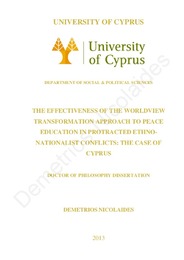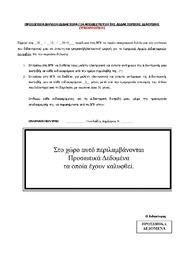| dc.contributor.advisor | Hadjipavlou, Maria | en |
| dc.contributor.author | Nicolaides, Demetrios A. | en |
| dc.coverage.spatial | Κύπρος | el |
| dc.coverage.spatial | Cyprus | en |
| dc.creator | Nicolaides, Demetrios A. | en |
| dc.date.accessioned | 2014-02-19T07:47:01Z | |
| dc.date.accessioned | 2017-08-03T09:56:41Z | |
| dc.date.available | 2014-02-19T07:47:01Z | |
| dc.date.available | 2017-08-03T09:56:41Z | |
| dc.date.issued | 2013-12 | |
| dc.date.submitted | 2013-12-20 | |
| dc.identifier.uri | https://gnosis.library.ucy.ac.cy/handle/7/39287 | en |
| dc.description | Includes bibliographical references (p. 163-187). | en |
| dc.description | Number of sources in the bibliography: 263 | en |
| dc.description | Thesis (Ph. D.) -- University of Cyprus, Faculty of Social Sciences and Education, Department of Social and Political Sciences, 2013. | en |
| dc.description | The University of Cyprus Library holds the printed form of the thesis. | en |
| dc.description.abstract | Η παρούσα διατριβή εξετάζει την αποτελεσματικότητα της εφαρμογής της Κοσμοθεωρίας του Μετασχηματισμού «(ΚΜ)». σε ένα καινοτομικό πλαίσιο της εκπαίδευσης για την Ειρήνη (Danesh & Danesh 2002a, 2002b, 2004b).
Η Κοσμοθεωρία του Μετασχηματισμού (ΚΜ) ως διαδικασία της παιδαγωγικής για την Ειρήνη, σε προηγούμενες έρευνες και μελέτες, έχει αποδειχθεί εξαιρετικά αποτελεσματική στη μετατροπή της αρνητικής και διχαστικής κοσμοθεωρίας σε θετικές και διαλλακτικές πεποιθήσεις. Συγκεκριμένα μετά την συμφωνία του Dayton στη Βοσνία-Ερζεγοβίνη εφαρμόστηκε ένα παιδαγωγικό πρόγραμμα για την Ειρήνη βασισμένο στις αρχές της ΚΜ με στόχο την επούλωση τραυμάτων του παρελθόντος και την προώθηση θετικών πεποιθήσεων μεταξύ Σέρβων, Βόσνιων και Κροατών.
Η παρούσα διατριβή εξέτασε την αποτελεσματικότητα της ΚΜ στα πλαίσια μιας παρατεταμένης εθνοκοινοτικής σύγκρουσης: την περίπτωση της Κύπρου. Ένα πρόγραμμα ΕΓΕ, παρόμοιο με αυτό που χρησιμοποιήθηκε στη Βοσνία – Ερζεγοβίνη, αναπαράχθηκε και εφαρμόστηκε σε τέσσερεις Ελληνοκυπριακές τάξεις σχολείων πρωτοβάθμιας εκπαίδευσης. Μια ομάδα εθελοντών δασκάλων επιλέχθηκε και στη συνέχεια εκπαιδεύτηκε με στόχο την κατανόηση των αρχών της ΚΜ, καθώς και το πώς αυτή η μέθοδος μπορεί να ενταχθεί στα προγράμματα των μαθημάτων τους. Το πρόγραμμα της ΚΜ υλοποιήθηκε κατά τη διάρκεια ενός ακαδημαϊκού εξαμήνου από τον Ιανουάριο έως τον Ιούνιο του 2012.
Οι τρείς βασικοί στόχοι της παρούσας μελέτης ήταν η αποτελεσματική αξιολόγηση των κοσμοθεωριών των μαθητών και μαθητριών, η καταγραφή πληροφοριών που επιβεβαιώνουν την πρακτική εφαρμογή αυτών των αντιλήψεων και η ακριβής επισήμανση οποιασδήποτε βελτίωσης στις κοσμοθεωρίες και εθνοτικές αντιλήψεις. Συνεπώς σχεδιάσαμε και χορηγήσαμε ερωτηματολόγια στους μαθητές/μαθήτριες καθώς και σε ομάδες ελέγχου πριν και μετά το πείραμα που αξιολογούν τους προαναφερθέντες στόχους.
Τα αποτελέσματα του πειράματος δείχνουν ότι το πρόγραμμα ΕΓΕ ήταν πράγματι αποτελεσματικό στη βελτίωση των αντιλήψεων, αλλά τελικά ήταν ανεπαρκή για την επίτευξη σημαντικών μεταλλαγών.
Η Ανάλυση Συνδιακύμανσης (Analysis of Covariance) χρησιμοποιήθηκε για να επισημάνει τις σημαντικές διαφορές μεταξύ της ομάδας παρέμβασης και της ομάδας ελέγχου. Συγκεκριμένα, οι μαθητές μεγαλύτερης ηλικίας παρουσίασαν σημαντικές αλλαγές στην αντίληψη της κοσμοθεωρίας τους, ενώ οι νεότεροι μαθητές επέδειξαν πιο θετική στάση απέναντι στον «άλλο » μετά την παρέμβαση . Όσον αφορά τη στάση τους απέναντι στη «σύγκρουση», η συμμετοχή στην παρέμβαση επέφερε μια μέτρια θετική αλλαγή. Τα αποτελέσματα έδειξαν ότι σε αντίθεση με τις αρχικές εικασίες, οι μαθητές δεν διατηρούσαν ισχυρές κοσμοθεωρίες βασισμένες στη σύγκρουση ή φανερά αρνητική στάση. Η συνεχιζόμενη παράταση της σύγκρουσης και η ελλιπής παιδαγωγική θεωρούνται ότι έχουν αρνητική επίδραση στην επιτυχή εφαρμογή της προσέγγισης ΚΜ. Περαιτέρω έρευνα απαιτείται για την απομόνωση και εξερεύνηση των προαναφερθέντων παραγόντων με μεγαλύτερη λεπτομέρεια. Η έλλειψη της κοσμοθεωρίας με βάση την επιβίωση ανάμεσα στα παιδιά συμπληρώνει τις πρόσφατες θεωρίες της κοινωνικής ψυχολογικής ανάπτυξης και, επομένως, αντιτάσσεται τη θεωρία του Danesh για την εξέλιξη της κοσμοθεωρίας. | el |
| dc.description.abstract | This dissertation explores the effectiveness of a particular approach to peace education, known as Worldview Transformation (WT) (Danesh & Danesh 2002a, 2002b, 2004b). The WT approach to peace education, in previous experiments, has been shown to be an effective pedagogical model. Following the cessation of violence in Bosnia-Herzegovina (BiH), an educational program, based on the principles of WT was implemented to reconcile past traumas and foster positive attitudes between the Bosniaks, Serbs and Croats.
This research sought to test the applicability of the WT approach in the conflict of Cyprus While the cases of Cyprus and BiH retain many similarities, particularly in their ethno-nationalist origins, each conflict however, retains unique dynamics, characteristics and root causes. The results of this research are particularly significant due to the incredibly limited scientific evaluation of in-school peace education programs in Cyprus. While many studies have explored the effectiveness of peace education in overcoming nationalist narratives, increasing empathy, mutual tolerance and respect in the case of Cyprus, they have all been conducted in out-of-school contexts. Furthermore, this research also represents the first exploration of the effectiveness of WT in protracted conflicts generally.
An EFP program, similar to that which was utilized in BiH was replicated and implemented in four Greek Cypriot primary school classrooms. Intrinsically motivated volunteer teachers were selected and subsequently trained to understand the principles of WT, as well as how it can be integrated into their classrooms. The EFP program was implemented over the course of one academic semester from January to June 2012. A total of 64 primary school students participated in the EFP program in the intervention group, with 42 students comprising the control groups. Pre and post intervention surveys were given to both groups which were designed to extract their worldviews in accordance with the principles and concepts of WT. Analysis of covariance was utilized to reveal significant differences between the intervention and control groups. Specifically, the older students reported significant change in the perception aspect of their worldview, while the younger students exhibited more positive attitudes toward the ‘other’ following the intervention. With respect to their attitudes toward ‘the conflict’, participation in the intervention resulted in a moderately positive change. The results showed that contrary to the initial assumptions, the students did not maintain strong conflict-based worldviews or overtly negative attitudes. The continued protraction of the conflict and a challenging pedagogy are assumed to have a negative effect on the successful application of the WT approach. Further research is needed to isolate and explore the aforementioned factors in greater detail. The lack of survival-based worldview amongst the children complements the recent theories of social psychological development and thus contradict Danesh’ theory of worldview progression. | en |
| dc.format.extent | xvii, 239, p. : tables ; 30 cm. | en |
| dc.language.iso | eng | en |
| dc.publisher | Πανεπιστήμιο Κύπρου, Σχολή Κοινωνικών Επιστημών και Επιστημών Αγωγής / University of Cyprus, Faculty of Social Sciences and Education | |
| dc.rights | info:eu-repo/semantics/openAccess | en |
| dc.rights | Open Access | en |
| dc.subject.lcsh | College students Psychology | en |
| dc.subject.lcsh | Cognition in children | en |
| dc.subject.lcsh | Social interaction | en |
| dc.subject.lcsh | Social representations | en |
| dc.subject.lcsh | Educational psychology | en |
| dc.subject.lcsh | Developmental psychology | en |
| dc.subject.lcsh | Constructivism (Education) | en |
| dc.title | The effectiveness of the worldview transformation approach to peace education in protracted ethno-nationalist conflicts : the case of Cyprus | en |
| dc.title.alternative | Η αποτελεσματικότητα της κοσμοθεωρία του μετασχηματισμού στα πλαίσια μιας παρατεταμένης εθνοκοινοτικής σύγκρουσης : την περίπτωση της Κύπρου | el |
| dc.type | info:eu-repo/semantics/doctoralThesis | en |
| dc.contributor.committeemember | Παπαδάκης, Γιάννης | el |
| dc.contributor.committeemember | Κατσικίδης, Σάββας | el |
| dc.contributor.committeemember | Ψάλτης, Χάρης | el |
| dc.contributor.committeemember | Ηρακλείδης, Αλέξης | el |
| dc.contributor.committeemember | Papadakis, Yiannis | en |
| dc.contributor.committeemember | Katsikides, Savvas | en |
| dc.contributor.committeemember | Psaltis, Charis | en |
| dc.contributor.committeemember | Heraclides, Alexis | en |
| dc.contributor.department | Πανεπιστήμιο Κύπρου, Σχολή Κοινωνικών Επιστημών και Επιστημών Αγωγής, Τμήμα Κοινωνικών και Πολιτικών Επιστημών | el |
| dc.contributor.department | University of Cyprus, Faculty of Social Sciences and Education, Department of Social and Political Sciences | en |
| dc.subject.uncontrolledterm | ΕΙΡΗΝΙΚΗ ΕΚΠΑΙΔΕΥΣΗ | el |
| dc.subject.uncontrolledterm | Η ΚΥΠΡΙΑΚΗ ΔΙΕΝΕΞΗ | el |
| dc.subject.uncontrolledterm | ΕΘΝΟΚΟΙΝΟΤΙΚΗ ΣΥΓΚΡΟΥΣΗ | el |
| dc.subject.uncontrolledterm | ΠΑΡΑΤΕΤΑΜΕΝΗ ΣΥΓΚΡΟΥΣΗ | el |
| dc.subject.uncontrolledterm | ΕΠΙΛΥΣΗ ΣΥΓΚΡΟΥΣΕΩΝ | el |
| dc.subject.uncontrolledterm | ΜΕΤΑΣΧΗΜΑΤΙΣΜΟΥ ΚΟΣΜΟΘΕΩΡΙΑ | el |
| dc.subject.uncontrolledterm | ΝΤΑΝΕΣ | el |
| dc.subject.uncontrolledterm | ΕΚΠΑΙΔΕΥΣΗ ΓΙΑ ΤΗΝ ΕΙΡΗΝΗ | el |
| dc.subject.uncontrolledterm | PEACE EDUCATION | en |
| dc.subject.uncontrolledterm | CYPRUS CONFLICT | en |
| dc.subject.uncontrolledterm | ETHNO-NATIONALIST CONFLICT | en |
| dc.subject.uncontrolledterm | PROTRACTED CONFLICT | en |
| dc.subject.uncontrolledterm | CONFLICT RESOLUTION | en |
| dc.subject.uncontrolledterm | WORLDVIEW TRANSFORMATION | en |
| dc.subject.uncontrolledterm | DANESH | en |
| dc.subject.uncontrolledterm | EDUCATION FOR PEACE | en |
| dc.identifier.lc | JZ5534.N54 2013 | en |
| dc.author.faculty | Σχολή Κοινωνικών Επιστημών και Επιστημών Αγωγής / Faculty of Social Sciences and Education | |
| dc.author.department | Τμήμα Κοινωνικών και Πολιτικών Επιστημών / Department of Social and Political Sciences | |
| dc.type.uhtype | Doctoral Thesis | en |
| dc.rights.embargodate | 2013-12-20 | |


